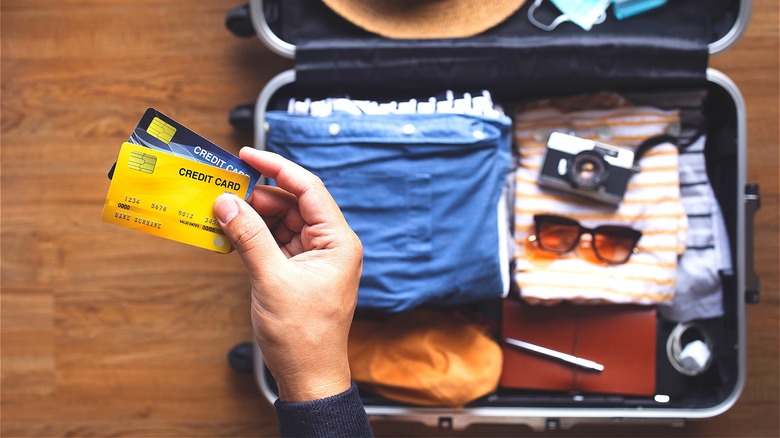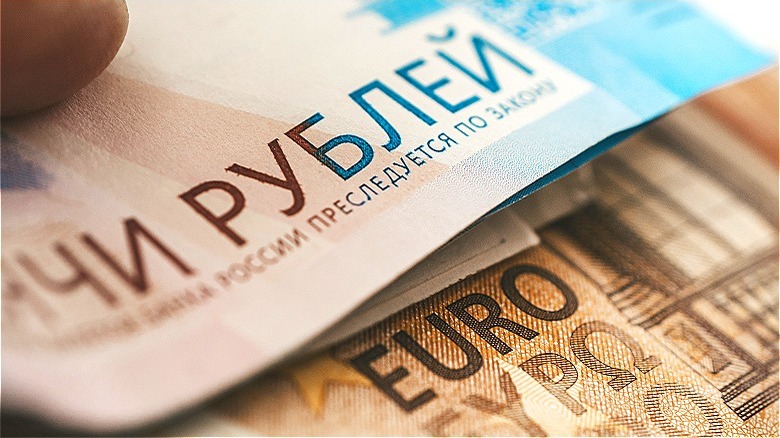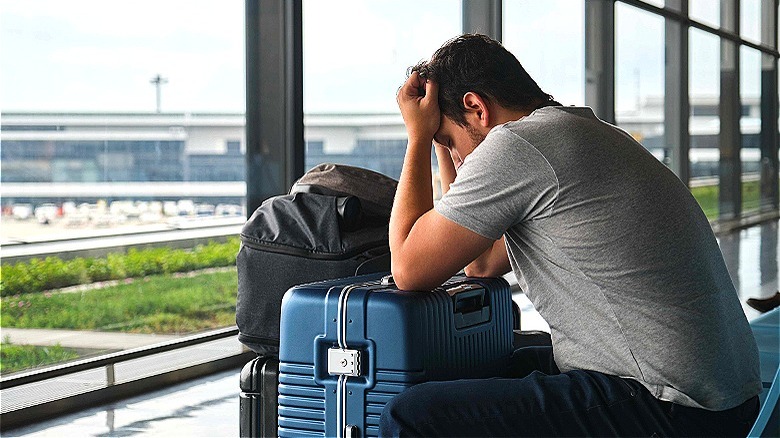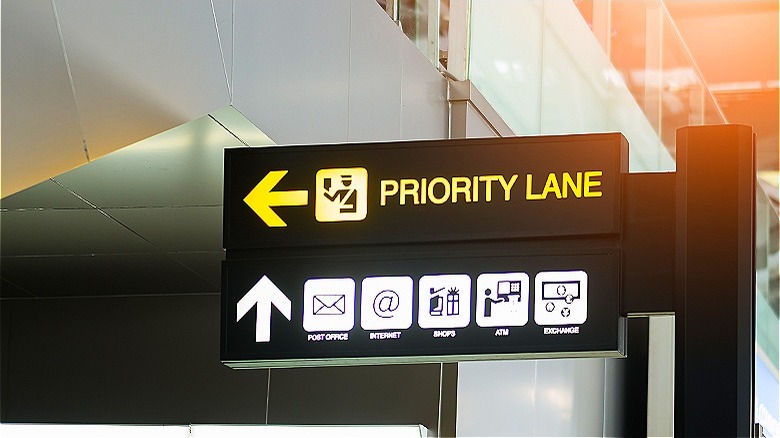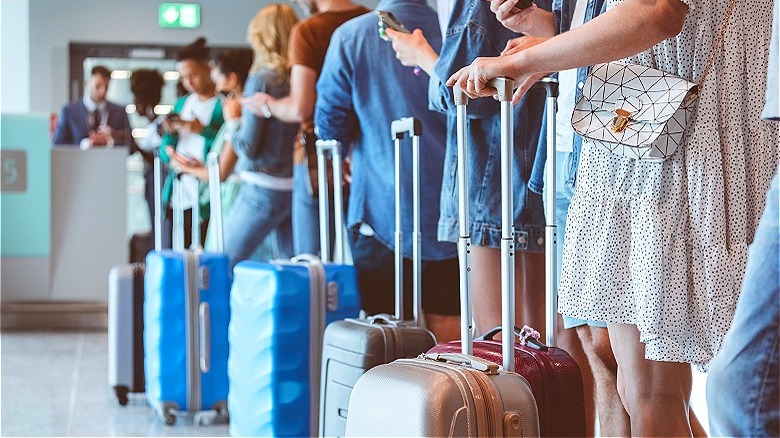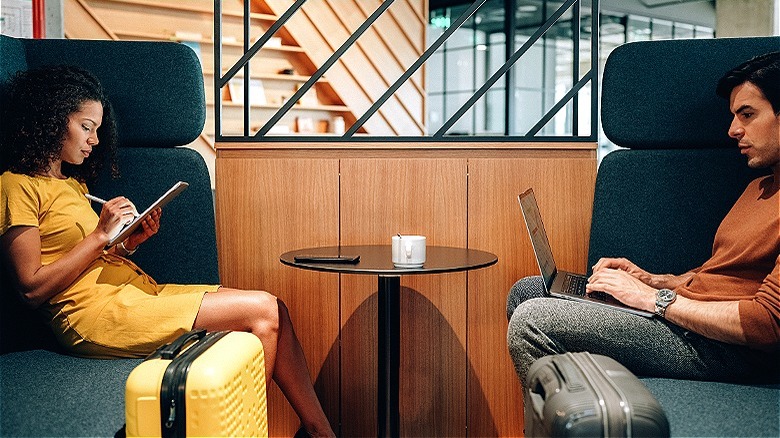These Little-Known Credit Card Perks Can Save You Money On Travel
Traveling has become quite a nightmare. Between add-on fees for every little thing (from bags to boarding to seat selection to snacks) to strict and often unforgiving reservation policies, it can feel like taking a simple flight is bleeding your wallet and sanity dry. According to a report from the U.S. Public Interest Research Group Education Fund, using data from the Department of Transportation, airline complaints in 2023 hit a new record high — 38,135 complaints — up 68% from the previous record broken in 2022. In fact, complaints against U.S. airlines increased by 109% year-over-year from January through May 2023 alone. While it might feel like there's nothing you, as a consumer, can do at times to make air travel less awful, an unexpected solution could be right in your wallet: your credit card.
You might be surprised to learn that credit card perks can help with some of the major consumer complaints against U.S. airliners. For instance, everything from the lack of refunds to damaged or missing baggage could be covered by your credit card's less well-known perks. At this point, most people know about points and miles, but did you know there are actually a LOT of smaller and less well-known ways to save you money (and hassle) while traveling? Reading the fine print of your credit card agreement could end up saving you more than a few dollars and tears during your next trip so let's dive into the underappreciated perks you should look for in your existing and/or new credit card.
Foreign transaction fees
Foreign transaction fees are fees charged by your bank (or credit card issuer) for using your card to make a purchase in a foreign currency. This could either be an electronic purchase made online with a foreign vendor or an in-person purchase made while traveling out of the country. If the transaction is made in a foreign currency, most financial institutions will charge you (usually between 1% to 3% of the purchase total) for the privilege. These fees can add up, especially if you're trying to stick to a vacation or travel budget. If you regularly travel and/or make purchases with foreign vendors on a regular basis, it could be worth looking for a credit card that doesn't charge foreign transaction fees.
Also, note that these fees aren't the same as currency conversion fees (which are usually 1% of the purchase total). If you choose to use a credit card that charges foreign transaction fees, your financial institution could choose to charge you for both things, making your initial purchase cost a lot more in the long run. Another thing to consider is that using a credit card abroad can also help you with the exchange rate. Your card issuer is more likely to use a better exchange rate than currency exchange kiosks or storefronts. Plus, there's the added security of knowing that if your card ends up lost or stolen, you won't be responsible for unauthorized purchases.
Trip cancellation insurance
Between COVID and increasingly unpredictable weather, just about everyone has a canceled trip horror story. These canceled plans can cause the loss of both money and time — not to mention the hassle of trying to get a refund. However, with airlines continuing to crack down on the consumer's ability to cancel or change reservations, the horror stories are more than likely only going to get worse. This is what can make your credit card's trip cancellation insurance perk so important.
Depending on your specific credit card and issuer, you could have a choice between trip cancellation or trip interruption coverage (some even offer both). These little-known travel perks can ensure you are reimbursed for eligible expenses in the event your trip is canceled or interrupted. This can't only save you the cost of whatever expenses you end up getting reimbursed for, but can also save you the added expense of purchasing your own separate trip insurance policy.
Keep in mind, most credit card companies will have specific lists of what qualifies as an eligible reason for a trip's cancellation so make sure you read the fine print on this perk before relying on it completely. Also, make sure to check the coverage limits for your credit card. Some cards will only reimburse up to certain dollar values and/or certain amounts per a set time period, so if you travel regularly, only being able to use this insurance once a year might not be worth it.
Boarding
You might find yourself dreading the inevitable boarding process in which it feels like 50 different gems, colors, and metals are called before getting to your boarding group. For this reason, it could be worth investigating a credit card that offers you that same annoying but (helpful) earlier boarding option.
This could prove especially useful when you consider that more and more people are choosing to carry on their bags (to both avoid checked baggage fees and to keep their luggage from getting lost), which creates issues at the gate and during boarding when overhead bin space fills up. This can make claiming overhead bin space increasingly competitive and, if you choose to carry on your bag, it can make your boarding priority more important than ever. Since those who board early typically have more overhead bin space to choose from, you could be saving yourself some added travel anxiety without having to pay more.
Many travel-specific credit cards offer priority boarding groups, depending on airline partnerships, and this can help you avoid the anxiety of being forced to gate-check your bag. It's also important to note that your credit card can help you way before you even reach the gate. Some credit cards offer credits or reimbursements for trusted traveler programs like Global Entry and TSA PreCheck. These programs allow you to use specially designated lines during airport security checkpoints that often have significantly shorter wait times. Getting these fees waived is another way your credit card can save you money while you travel.
Your bags
Some credit cards (especially co-branded airline credit cards) offer customers free checked baggage. Depending on the card, your might also get free checked bags for your companions or family on your same reservation. Generally speaking, this free baggage is relegated to domestic flights but it can still add up in savings if you travel a lot. Keep in mind that most of the cards that offer free baggage perks typically have annual fees, so it could be worth calculating just how much you travel to figure out if this travel perk is really worth it.
Another thing to consider is just how often airlines lose luggage. Certain airlines, in particular, are more likely to lose your bag than others. (If you're curious, according to the Bureau of Transportation Statistics' monthly Air Travel Consumer Report from November 2022, American Airlines is the most likely to lose your bag.) While the Department of Transportation states that, in the event of a lost bag, airliners are required to compensate you up to $3,800 per passenger, plus any fees you might have paid for your bag in the first place, your bag might have had irreplaceable cargo.
Plus, the headache of having to replace lost items can ruin a perfectly good vacation. With that in mind, some credit cards offer lost luggage reimbursement or baggage delay insurance that reimburses you a certain amount per day while your bags are delayed. This perk can have monetary and term limits so make sure to double-check your card's information before taking a trip.
Airport lounges
Depending on your credit card issuer, and the specific type of credit card you have, you might be eligible to use branded airport lounges. These spaces can be life-saving oases during long days of travel. Plus, many of these lounges will allow you to bring in a guest either for free or at a discounted use rate. Also, given how expensive everything in an airport is, the lounge can help you save money on overpriced food, water, and essentials since lounges generally offer free food and drinks. Access to lounges can be especially useful for long layovers or in the event of a canceled or missed flight. Being able to charge electronic devices can be key in contacting friends, family, or even customer support in the event of an issue.
However, keep in mind that just being a cardholder might not be enough to gain access to airport lounges. You might need a specific credit card level and/or to be enrolled in your card issuer's lounge membership program to enjoy this lesser-known perk. With that in mind, most airport lounges do allow non-cardholders access for a fee so it might not necessarily be cost-effective to pay a card's higher-annual fee to gain access to airport lounges unless you use them quite regularly. Plus, check your card's lounge policies regarding guests and/or family. If you do a lot of traveling with other people, find out if everyone will have access to the airport lounge, rather than just you alone.
